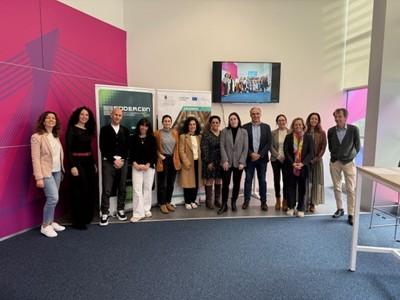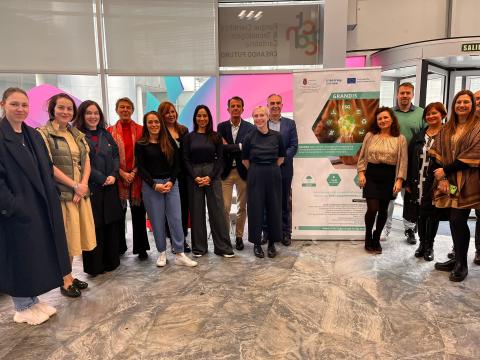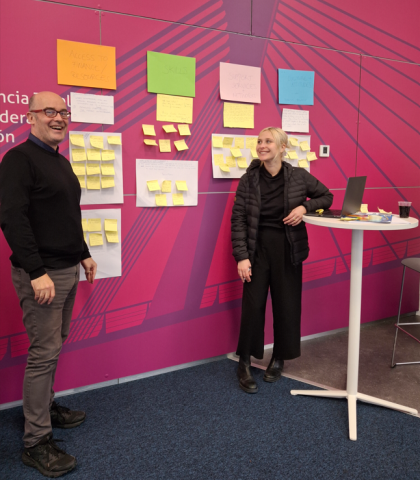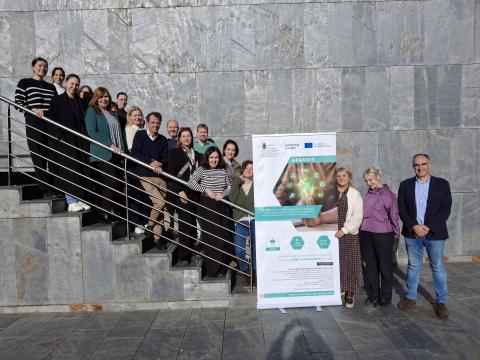GRANDIS 2nd Interregional Meeting in Santander
The second transnational exchange of the Interreg Europe GRANDIS project took place in Santander, Spain, on 26–27 November 2024. Hosted at the Xtela Tower in the Cantabrian Science and Technology Park, the two-day event brought together project partners, regional stakeholders, and ecosystem actors to explore the systemic challenges women face in leading the green and digital transitions. The gathering combined the second GRANDIS Interregional Meeting (GIM2), a study visit, and a Steering Group meeting.
Day 1: Co-creating a Gender-Inclusive Vision for the Twin Transition
The programme began with a welcome address from Mr. Javier Puente, General Director of Innovation for the Government of Cantabria. This was followed by an agenda overview by Francesca Martemucci of Resolvo. The day’s central feature was the Challenge Mapping Workshop, a highly participative design-thinking session led by Madeline Langlois of EIfI-Tech.
Drawing on findings from regional desk research and empathy workshops, the session enabled partners and stakeholders to co-create “challenge statements” that reflect the real experiences of women navigating entrepreneurship in the context of the green and digital transitions. Local female professionals, entrepreneurs, and ecosystem representatives participated alongside GRANDIS partners in small-group discussions. Together, they highlighted barriers related to access to finance, skills development, work-life balance, cultural perceptions, and the sustainability of support networks.
Key insights from the workshop included:
-
Support services and networks are often unsustainable due to an overreliance on volunteerism and the absence of sector-specific mentorship.
-
Access to finance remains limited for female-led start-ups, particularly due to low risk tolerance in public financial instruments and persistent gender bias in funding decisions.
-
Work-life balance and cultural attitudes were revealed as cross-cutting challenges. Meeting formats and institutional structures often overlook caregiving responsibilities, and societal stereotypes continue to discourage women from pursuing STEM or leadership roles.
-
The lack of targeted skills development and limited access to training and digital tools further compound exclusion, particularly for women juggling entrepreneurial and personal obligations.
The session not only provided a shared understanding of these challenges but also established a foundation for the upcoming regional Challenge Mapping workshops to be implemented by each partner in their territories.
Following this, a Good Practice identification workshop introduced the macro areas that would guide the next project phase—attitudes, skills, access to finance, networks, and work-life balance.
The afternoon featured an engaging study visit spotlighting the entrepreneurial ecosystem in Cantabria, particularly women-led university spin-offs. Through in-depth discussions with regional actors, participants gained a practical understanding of local initiatives that intersect with GRANDIS objectives.
Three prominent speakers shared personal experiences and systemic reflections:
-
Patricia Pérez, a sustainable design entrepreneur and co-founder of Now Studio.
-
Teresa Iglesias, head of TIM Consulting and a key player in FEMINA’s regional mentoring efforts.
-
Natalia Alciturri, CEO of Semicrol.
The day concluded with a joint networking dinner at Bodega el Riojano in central Santander, offering further opportunities for informal exchange among participants.
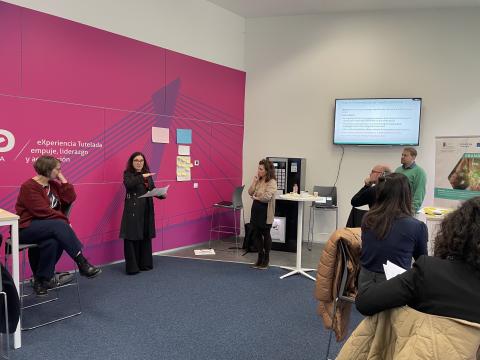
Day 2: Good Practices, Governance, and Next Steps
The second day opened with the continuation of the study visit, focusing on local institutional support. Moderated by Ignacio Abaitua (SODERCAN), the panel showcased two regional case studies of intrapreneurship:
-
Isabel Muñoz García, co-founder of Laser Maintenance Solutions, and
-
Biuse Casaponsa, founder of DAPHNIA—both finalists of the FEMINA LAB 2022.
Speakers from SODERCAN, the Cantabria Chamber of Commerce, and the Spanish Observatory for Entrepreneurship offered valuable perspectives on how regional policies can better support women-led innovation.
Later in the morning, the Steering Group Meeting convened project managers for practical discussions on project implementation, financial reporting, and communication updates.
Before closing, each partner delivered a presentation on the progress made toward the policy instruments addressed within their respective regions. The meeting concluded with a session outlining the next steps, including the launch of the regional Challenge Mapping workshops.
The Santander exchange reaffirmed the GRANDIS project’s commitment to transforming systemic barriers into actionable insights and inclusive policy change. By fostering open dialogue, hands-on collaboration, and direct engagement with regional pioneers, the event strengthened both interregional learning and the collective vision for a gender-equal twin transition.

